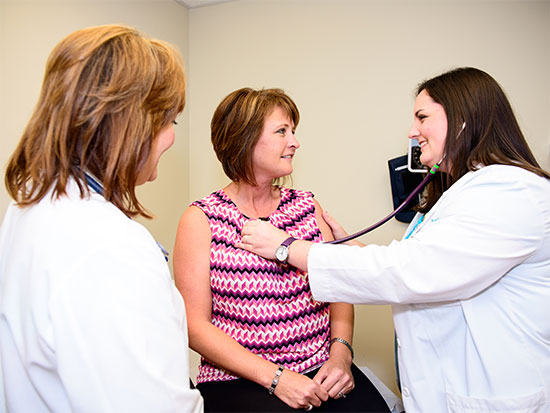 “The addition of this program further emphasizes how UAB continues to innovate and grow,” said Selwyn Vickers, M.D.To continue addressing the critical need for more primary care physicians in Alabama, the University of Alabama at Birmingham School of Medicine will offer a new track in its four-year medical degree program.
“The addition of this program further emphasizes how UAB continues to innovate and grow,” said Selwyn Vickers, M.D.To continue addressing the critical need for more primary care physicians in Alabama, the University of Alabama at Birmingham School of Medicine will offer a new track in its four-year medical degree program.
The Primary Care Track is designed to provide students a strong foundation in clinical medicine focused on preparation for residency training in primary care and other community-based specialty fields, through longitudinal experiences with patients, lasting relationships with mentoring physicians, and special programming on population health and physician leadership skills.
The Primary Care Track is in collaboration with the University of Alabama’s College of Community Health Sciences, which serves as the School of Medicine’s Tuscaloosa Regional Campus. Students in the Primary Care Track will spend their first two years completing the prerequisite basic science curriculum in Birmingham. Primary Care Track students will spend their third year in a model of clinical education called a longitudinal integrated clerkship, known as a LIC, based in Tuscaloosa or other communities around the state.
Beginning in 2017, students applying to the School of Medicine through the American Medical College Application Service will have the option to choose the Primary Care Track within the secondary application.
The School of Medicine has made increasing the number of students who pursue a career in primary care a key component of its mission to serve the state. A 2016 study by the Association of American Medical Colleges shows a drastic need for primary care physicians. The problem is especially acute in Alabama — in 2012, the state had 3,512 active primary care physicians for a ratio of approximately 73 per 100,000 people, ranking it 45th in the nation. The provider shortage is even worse in rural areas — 55 of Alabama’s 67 counties are considered rural, and eight Alabama counties have no hospital at all.
Primary care-oriented training is also an excellent experience for individuals who envision a community-based career in a variety of non-primary care specialties.
| “The primary care needs in Alabama are important enough that we’ve created this track, not only to identify prospective medical students who are interested in primary care, but to offer students experiences, mentorship and guidance that will be valuable throughout their medical educations and into their careers.”
—Craig J. Hoesley
|
“The primary care needs in Alabama are important enough that we’ve created this track, not only to identify prospective medical students who are interested in primary care, but to offer students experiences, mentorship and guidance that will be valuable throughout their medical educations and into their careers,” said Craig J. Hoesley, M.D., senior associate dean for Medical Education.
During the LIC, students learn clinical medicine, population health and the business of medicine in a community environment reflective of where most medicine is practiced. They work alongside faculty for a majority of the year to follow and care for patients longitudinally, learning across the core disciplines of medicine and in all settings, including outpatient clinics, hospitals, nursing homes and patients’ homes. This is a departure from the traditional model — a series of discipline-specific and hospital-dominant four- to eight-week clerkships. Students typically experience few encounters with the same patient and only single episodes of illness, very different from that of a community-based longitudinal experience.
“Most care is provided in the community, and all patients ultimately come from and return to the community, even when care is needed in tertiary settings,” said Richard H. Streiffer, M.D., regional dean of the Tuscaloosa Regional Campus and dean of the UA College of Community Health Sciences. “Students in the LIC become part of the community, and hence have the unique opportunity to understand heath care, disease and wellness, and social influences on health over time and in the context of family, community and social influences. The fundamental unifying principle of this educational approach is continuity — continuity of teachers, of community and setting, of patient care. Relationships and trust build between students, their teachers and their patients, facilitating the learning and insight essential to the lifelong learner that community-oriented physicians need to be.”
“The addition of this program further emphasizes how UAB continues to innovate and grow,” said Selwyn Vickers, M.D., FACS, senior vice president and dean of UAB’s School of Medicine. “Experience has shown that students who complete a LIC are highly competitive residency candidates — they graduate with self-directed learning skills, have a strong grasp of patient management and the consultation and referral system, and can effectively utilize community resources.”
The first group of Primary Care Track students will apply to the program this summer.